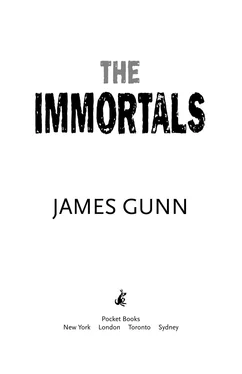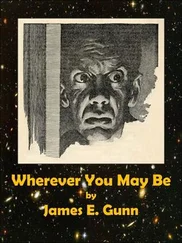Barbara looked at her future: Mr. Tate. She shuddered. When she looked at Sibert, her face was dead and white. “Why did you do it?” she asked.
“You’ve got it all wrong, Bobs—” he began desperately.
“No,” she said without inflection, “I’ve finally got it all right. I couldn’t let myself wonder, before, why you should fall in love with someone as plain as I am. I was still the princess in disguise; I wouldn’t let myself doubt. Now I’ve got it straightened out.”
“No, Bobs!” Sibert protested hoarsely. “I was following the plan—”
“Your plan, maybe. You changed the ending a little. You were going to sell me, really. I should never have believed that absurd story you told me at the motel. I should have known you could never believe it yourself. You’re too ruthless to understand a human impulse. You’ve killed three people already—”
“Bobs, I swear this wasn’t part of it!”
“Oh, I believe that. You were clever, but not clever enough. They win. And you lose everything. I’m sorry for you, Eddy. I loved you. You could have had immortality. But you threw it away.”
Sibert’s face worked ungovernably as he looked away, unable to endure the cold knowledge in her eyes. When he looked toward her again, the three men were once more beside her. They led Barbara toward the door; she did not look back.
“Put her in the apartment below,” Locke said. “You know the one—it’s been ready for long enough. Man every guard station; she must be watched every second. She’ll try suicide. The man who lets her succeed will take a year dying.”
Then she was gone. Locke turned back to Sibert. He smiled. “You can’t beat the organization; you should have known that. No one can.” He paused. “You told me once that you weren’t a very good actor, Sibert. You were right; we picked you up at Joplin. As soon as you left the motel, we grabbed the girl. My only problem now is what to do with you.”
“I’ve got protection,” Sibert said quickly.
“That letter you wrote before you were shot?” Locke shook his head pityingly. “It was routine to check the mailbox after your escape.”
The lips of the thing in the wheelchair moved; a thready whisper escaped into the room. Locke nodded.
“Mister Tate says there is no problem: You must die. You saw his face. You must die, of course. The question is: How? We’d like to hand you over for murder, but you know too much.
“For now, we’ll put you away. You’ll have time to consider your sin. It’s an old one—Adam and Eve succumbed to it, too. And it’s the unforgivable one: too much knowledge.”
* * *
The cell somewhere in the interminable levels beneath the building was bare except for the plastic bunk. Sibert sat motionless on the bunk, unable to sleep, unable to stop thinking. Somewhere he had gone wrong. And yet—he couldn’t pin down any moment when he could have acted otherwise. He had to look out for himself; no one else would. He had to make the only possible deal that would give him immortality and freedom from violent death.
You can’t fight organization. He and Barbara could never have escaped permanently and hidden forever. One day they would have been found, and then—the end for him—and for her, her destiny, however arrived at. She was too rare a thing ever to be a person, too valuable to be more than a possession. She was something to be used.
Yes, Barbara had loved him; many women had loved him. But only because he had learned them, and played upon them, had wooed them skillfully and with eternal patience. Where had he gone wrong?
The bolt whispered in the solid steel door, the only exit from the cell. Silently Sibert was on his feet, his body tense, prepared for anything. The door swung toward him.
“Liz!”
She stood in the doorway, her eyes fixed on his face. He was beside her in two strides.
“I thought you were—Liz!” he said brokenly. “Am I glad to see you!”
In her hand was a handgun. She held it out. He wrapped his hand around it and around her hand. She pulled her hand free.
“Liz!” he said. “I don’t know what to—”
“Don’t say it!” she said. “You’ve used me, just as you’ve used every other person you ever knew. You’re a cold-blooded snake and a killer. But I couldn’t let them kill you. From now on it’s up to you. Don’t ever let me see you again; I may kill you myself.”
She turned and walked away swiftly. She didn’t look back.
“Liz!” Sibert called after her in a whisper. “Where’s the girl?”
Then she looked back at him, pointed a finger straight up, and was gone.
Cautiously Sibert followed her along the dark corridor. By the time he reached a ramp leading up, even her footsteps were gone. Sibert eased up one ramp. The corridor above was empty. He climbed a second ramp, puzzled by the silence.
In the second corridor a man was crumpled on the cold concrete floor. Sibert bent over him. He was breathing heavily; there wasn’t a mark on his face or head.
Violently the corridor began to clang!
Sibert straightened instantly and ran. A few paces along the corridor, beside a window looking into a room within, a second man was stretched on the floor. Sibert didn’t pause.
At the first ramp he sprinted up again—directly into the midst of a handful of guards descending. They twisted the gun out of his hands. After a moment’s discussion, two of them took him to Locke.
The office was thunder and lightning. Scenes flickered across one wall, revealing room after room of chaos and shouts of madly running men and women. Locke, spinning from desk to wall to phone, barked orders into the air. In the corner Mr. Tate huddled in his chair, his parchment eyelids closed over sunken eyes.
With a final vicious gesture, Locke gripped his chair arm, and the wall went dark. With the lightning went the thunder. In the silence he groaned. “She’s gone.”
“Gone?” Sibert echoed.
“Where is she?” Locke snapped. “How did you do it?”
“What makes you think I did it?”
“Somehow you got out of your cell. Somehow you knocked out five guards and got the girl away. Why you stayed behind I don’t know, but you’d better start answering questions now.”
Slowly Sibert shook his head. “It’s hard to find the hen that lays the golden eggs,” he said softly, “but it’s even harder to keep her.”
“Take him to the interrogation room,” Locke ordered.
The guards gripped his arms tighter. The thing in the corner rolled forward; its mouth opened.
“Wait!” Locke said. The guards hesitated. “Mister Tate is right. You’re a stubborn man, Sibert, and you’re our only link to the girl. We’ll work with you. If necessary we’ll pay your price. Meanwhile you’ll be watched. You’ll have no chance to escape. One thing I want to know: who helped you?”
“Isn’t there someone else missing?” Sibert asked quietly.
“Sanders,” Locke growled. “It couldn’t be Sanders. He’s been here twenty years.”
“Well?” Sibert said, shrugging. He would save Liz; she might come in handy once more. He had lost Barbara, but he had won a reprieve. It would last as long as the patience of men who are dying, day by day, and cannot face the night.
They would not catch Barbara now. Not the girl who had snatched a mortally wounded man from among them and hidden him away and nursed him back to health, who had only been caught because that man had delivered her into their hands.
She was wiser now. She would trust no one. It was a lesson immortals should learn early.
Sometime soon, Sibert thought, he would have a chance for escape; he must be ready for it. He would play their game and wait and watch, and before they learned that he’d had nothing to do with Barbara’s escape, his chance would come.
Читать дальше












